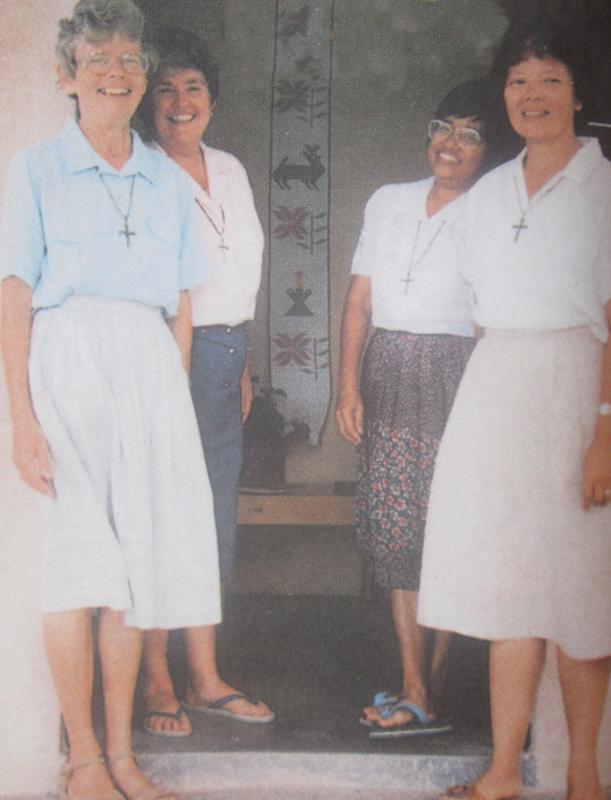Hope...amid Tears
By Sr. Janice McLaughlin, mm
Maryknoll Sisters see peace building at heart of their service to the people of East Timor.
East Timor’s Bishops Carlos Ximenes Belo issued an SOS for his people, and Maryknoll Sister’s responded, four missionaries now one a Filipino, serve in this “land of tears.”
Massacre
Nine days after East Timor declared its independence in 1975, Indonesia invaded the former Portuguese colony and killed 60,000 people, including innocent civilians as well as armed rebels. With the Indonesian army continuing its iron-fisted rule, Bishops Belo said “We are dying as a nation and as a people.” He invited religious congregations to come and help them, the Maryknoll Sisters working in neighboring Java accepted the invitation and arrive in Dili, the capital, in 1991. They are stationed in Aileu, a mountainous are south of Dili.
International group
Sister Harriet Lum, from Honolulu, Hawaii, Nora Maulawin, from Manila, Philippines, Susan Gubbins, from Chicago, III., and Dorothy McGowan, from Bronx, N.Y. see peace building, reconciliation, dialogue and service at the hear of their mission, “On the surface it looks calm,” says Gubbins. “But when you get into the people’s lives, you find them suffering.”
1562
Catholicism was introduced to Timor by three Portuguese Dominicans in 1562 but never made much headway. Since 1975, however, the number of Catholics has jumped from had jumped from 30 percent to 90 percent of the 700, 000 people. Historian Peter Carey explains one reason for this growth since the invasion: “The Church became the only, institution capable of communicating independently with the outside world and of articulating the pain of the East Timorese.”
Simple Living
Srs. McGowan and Gubbins run to clinic and train health promoters. “Though we don’t charge at the clinic, people often offers us eggs, vegetables, fruits and even live chickens,” McGowan says, “One of the hardest challenges is accepting food from the poor, but it reflects the life they share with us.” She adds with a smile, “We find our own nutrition improving!”
Lum, principal of Ailue’s St. Paul’s High school, says, “Many of our 200 students are orphans whose parents were killed after the invasion or who died from tuberculosis or malaria.”
Sr. Nora Maulawin does pastoral work with Timorese Father Demetrio. “Each day,” she says, “brings moments when I am evangelized by these simple farmers. In spite of pain, there is hope for peace.”
Timor’s peacemaker
Bishops Carlos Ximenes Belo was named by Pope John Paul II to be apostolic administrator of his home, diocese of Dili, East Timor, in 1988. The dynamic prelate immediately begun speaking out in defense of the East Timorese people faced with continuing Indonesian occupation and serious human rights violations.
In a 1989 appeal to the United Nations for a referendum, Bishops Belo said, “Indonesia says the people of East Timor have already chosen integration, but the people of Timor never said this.” The Bishop’s appeal was never acknowledged, and the army threatened his life.
The international community has turned a blind eye to the problems of East Timor. Attention was momentarily focused on the island in November 1991 when Indonesian troops shot and killed 200 unarmed demonstrators at the funeral of a young man killed by the military. Condemning the massacre, Bishop Belo declared, “We are living in fear, not peace.”
Last June, however, international negotiations tool place for the first time between supporters and opponents of East Timorese integration with Indonesia. Bishop Belo was a key mediator, urging participants to bury their differences and work for peace. “The need for an authentic peace in East Timor that respects the interests of all sides has never been more imperative, “Belo said. “And the chances for such a peace have never been greater.”

